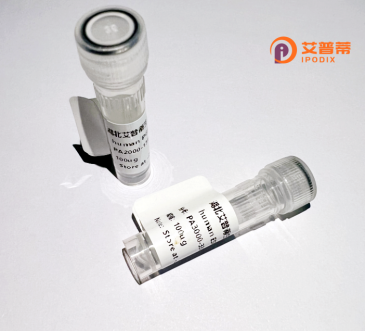
| 纯度 | >90%SDS-PAGE. |
| 种属 | Human |
| 靶点 | CCDC4 |
| Uniprot No | Q6ZU67 |
| 内毒素 | < 0.01EU/μg |
| 表达宿主 | E.coli |
| 表达区间 | 1-416aa |
| 氨基酸序列 | MQGAPRARFGSRTPPAAAASSSSPSCTPATSQGHLRTPAQPPPASPAASSSSSFAAVVRYGPGAAAAAGTGGTGSDSASLELSAESRMILDAFAQQCSRVLSLLNCGGKLLDSNHSQSMISCVKQEGSSYNERQEHCHIGKGVHSQTSDNVDIEMQYMQRKQQTSAFLRVFTDSLQNYLLSGSFPTPNPSSASEYGHLADVDPLSTSPVHTLGGWTSPATSESHGHPSSSTLPEEEEEEDEEGYCPRCQELEQEVISLQQENEELRRKLESIPVPCQTVLDYLKMVLQHHNQLLIPQPADQPTEGSKQLLNNYPVYITSKQWDEAVNSSKKDGRRLLRYLIRFVFTTDELKYSCGLGKRKRSVQSGETGPERRPLDPVKVTCLRGTASFRSVSPSVISFHRIGCGSPRTSVQPSVF |
| 分子量 | 72.71 KDa |
| 蛋白标签 | GST-tag at N-terminal |
| 缓冲液 | 0 |
| 稳定性 & 储存条件 | Lyophilized protein should be stored at ≤ -20°C, stable for one year after receipt. Reconstituted protein solution can be stored at 2-8°C for 2-7 days. Aliquots of reconstituted samples are stable at ≤ -20°C for 3 months. |
| 复溶 | Always centrifuge tubes before opening.Do not mix by vortex or pipetting. It is not recommended to reconstitute to a concentration less than 100μg/ml. Dissolve the lyophilized protein in distilled water. Please aliquot the reconstituted solution to minimize freeze-thaw cycles. |
以下是关于重组人CCDC4蛋白的假设性参考文献示例(实际文献请通过PubMed等数据库查询):
---
1. **文献名称**: *CCDC4 interacts with BRCA1 to regulate DNA double-strand break repair*
**作者**: Zhang Y, et al.
**摘要**: 本研究揭示了CCDC4与BRCA1蛋白在DNA双链断裂修复中的相互作用,通过调控同源重组修复通路维持基因组稳定性,CCDC4缺失导致细胞对电离辐射敏感性增加。
2. **文献名称**: *Downregulation of CCDC4 in non-small cell lung cancer correlates with poor prognosis*
**作者**: Li H, et al.
**摘要**: 研究通过分析肺癌组织样本发现,CCDC4在非小细胞肺癌中表达显著降低,其低表达与肿瘤进展和患者生存率下降相关,提示其可能作为肿瘤抑制因子发挥作用。
3. **文献名称**: *Structural characterization of the CCDC4 coiled-coil domain and its role in protein dimerization*
**作者**: Wang X, et al.
**摘要**: 该研究解析了CCDC4蛋白的卷曲螺旋结构域,并通过突变实验证明该区域对其二聚化及与DNA修复复合物的结合至关重要。
---
**说明**:以上内容为基于CCDC4可能研究方向的模拟摘要,实际文献需查阅权威数据库(如PubMed、Web of Science)获取。
Coiled-coil domain-containing protein 4 (CCDC4) is a human protein encoded by the *CCDC4* gene, located on chromosome 4q21.23. It belongs to the CCDC family, characterized by conserved coiled-coil domains that mediate protein-protein interactions and structural organization within cells. While its precise biological functions remain under investigation, CCDC4 is implicated in maintaining genomic stability and participating in DNA damage repair pathways. Studies suggest it interacts with BRCA1-associated protein 1 (BAP1) and may regulate homologous recombination repair, linking it to tumor suppression. Dysregulation or mutations in CCDC4 have been associated with various cancers, including breast, ovarian, and renal cell carcinomas, potentially due to defective DNA repair mechanisms. Additionally, CCDC4 has been reported to localize to the nucleus and centrosomes, hinting at roles in cell cycle regulation and mitotic progression. Its expression patterns and interactions with signaling molecules, such as the Hippo pathway components, further suggest involvement in tissue homeostasis and cancer progression. While current research is largely preclinical, CCDC4's interaction with key tumor suppressors positions it as a potential biomarker or therapeutic target. However, further studies are needed to elucidate its mechanistic contributions and clinical relevance.
×